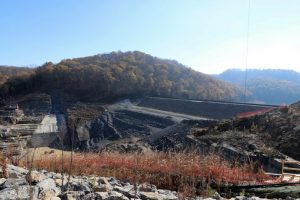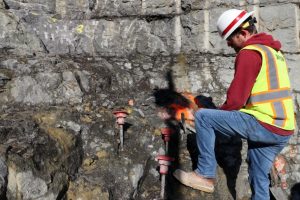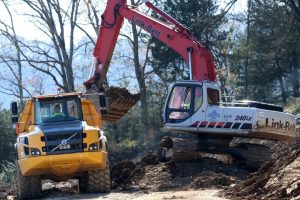December 26, 2018
By: Ashley Webster, Nashville District Public Affairs
The U.S. Army Corps of Engineers Nashville District and contractor Thalle Construction Company are moving towards the conclusion of the Center Hill Dam Safety Rehabilitation Project.
The start of December marked the completion of foundation preparation for a “roller-compacted concrete” reinforcing berm downstream of Center Hill’s auxiliary dam, work that began in January 2018. A minimum of two-feet of conventional concrete, referred to as ‘mud matting,’ was placed on the 125-foot wide by 800-foot long cleaned bedrock base to allow for a good working surface to begin placement of the RCC.
The Corps blasted and excavated about 65,000 cubic yards of rock to create a solid, notched base for the large 100-foot high by 1000-foot long concrete RCC berm. The exposed rock base was then geo-mapped.
“Geo-mapping gives the agency a detailed reference picture of the bedrock, which will be the natural base of the berm foundation,” said Tommy Hollowell, Nashville District geologist. “This will allow us to plan placement of the expansion and contraction joints in the concrete berm and to monitor specific rock formations if any future issues arise.”
About two-foot diameter rocks and smaller, recycled from stabilization excavation at Center Hill Dam’s left rim, have been placed between the auxiliary dam and RCC berm. The rock fill will place pressure on the downstream auxiliary dam embankment and reduce the risk of internal erosion.
Grouting 25 feet into the mud matting and bed rock is also nearing 70 percent complete.
Linda Adcock, U.S. Army Corps of Engineers Nashville District project manager, explained that the grout fills any voids that may exist between the two layers, and ‘locks’ the layers together ensuring a solid foundation for the placement of concrete to suport the berm. Concrete placement is expected to begin in January.
Thalle Construction Company has the concrete batch plant equipment in place to produce the special type of concrete, RCC, which resembles more of a solid than a liquid. As this concrete is placed on the berm site, it will be spread by a blade and compacted with a vibrating roller into one-foot layers.
“Roller compacted concrete resembles a mixture of dirt and rock more than typical, conventional concrete, due to its low moisture content,” Adcock said. “The advantage of this type of concrete is place using traditional road paving equipment which is generally much more efficient than placing typical conventional concrete.”
Alan Malcomb, civil engineer and contracting officer for the Roller Compacted Concrete phase, said the winter weather may pose a challenge the Corps of Engineers and Thalle Construction because when temperatures drop below 35 degrees Fahrenheit and precipitation exceeds a tenth of an inch per hour, concrete placement must be halted.
As work approaches the last chapter for the concrete berm, site restoration on the southwest side of Center Hill Dam is underway. The area previously known as Eisenhower Park or Center Hill Park has served as a work platform for the Dam Safety Rehabilitation Project during the past 10 years. Bluegrass Construction Corporation is grading the area and will build picnic sites, three shelters, a comfort station, and a boat ramp allowing access to Center Hill Lake. The RCC Berm and the restored boat ramp and lake access are planned to be finished by the end of 2019. The RCC berm completion is necessary before Center Hill Lake can return to normal operating lake levels.






